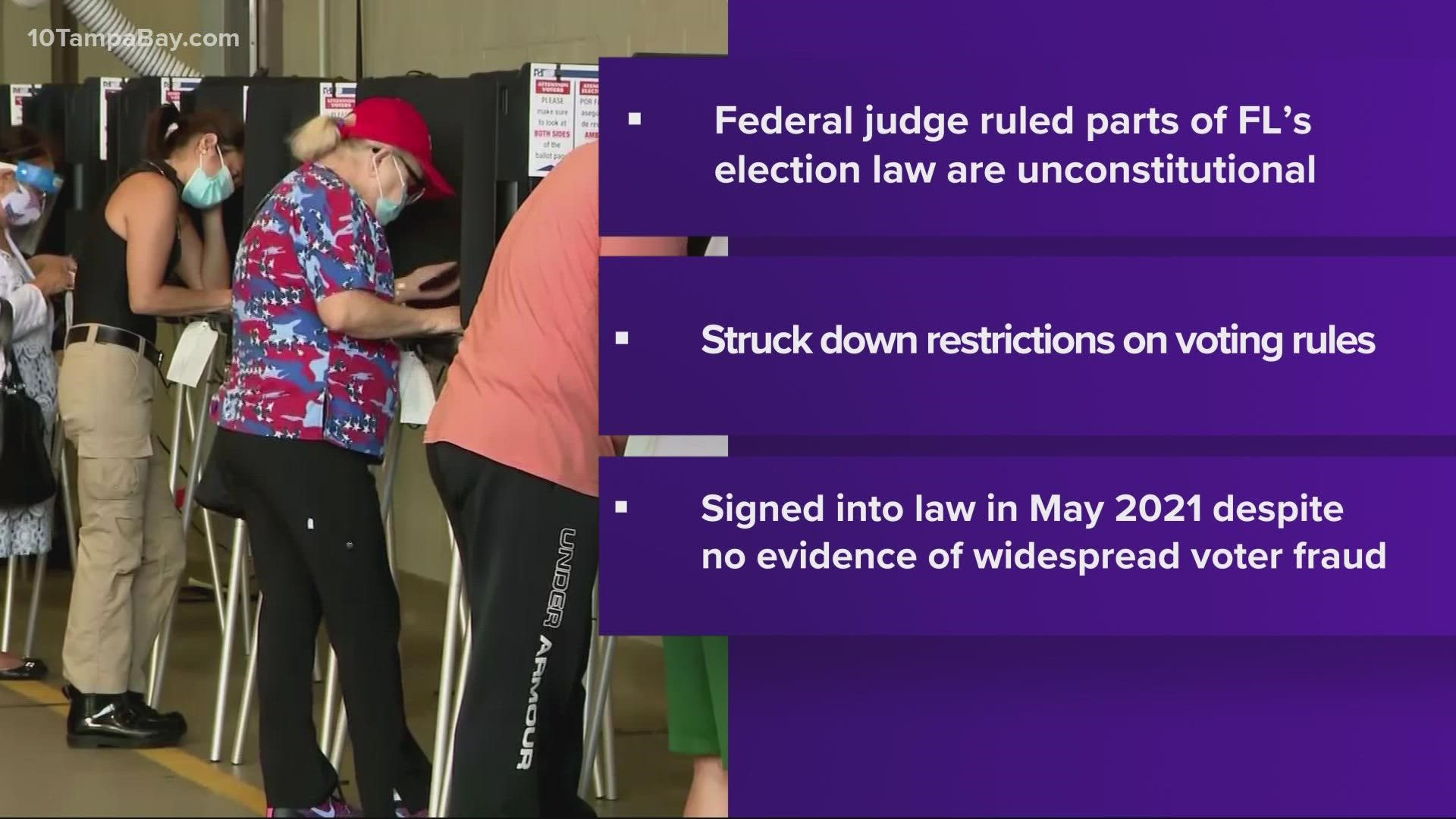TALLAHASSEE, Fla. — A federal judge on Thursday struck down portions of Florida's controversial election law that placed restrictions on voting rules despite there being no evidence of widespread fraud.
U.S. District Judge Mark Walker found portions of the law to be unconstitutional, including when ballot drop boxes could be used. The law mandated that they be guarded and available only when elections offices and early voting sites are open, with an exception to those in supervisors' offices.
Walker also struck down new requirements on third-party voter registration organizations and found "engaging in any activity with the intent to influence or effect of influencing a voter" as written as part of the new law also is unconstitutional.
"The solicitation definition can be read to prohibit 'line warming' activities," Walker wrote. "Line warming refers generally to the non-partisan provision of aid to voters waiting in line to vote, such as giving out water, fans, snacks, chairs, ponchos, and umbrellas."
The League of Women Voters of Florida, Black Voters Matter and the Florida Alliance For Retired Americans filed a lawsuit challenging Senate Bill 90 almost as soon as it was signed into law by Gov. Ron DeSantis in what appeared to be a made-for-TV ceremony on Fox News in May 2021.
The organizations were joined by several individual voters in their legal challenge of what they described as Florida's voter suppression bill.
"SEE YOU IN COURT!" Black Voters Matter tweeted.
DeSantis contended he believes the law is necessary to beef up enforcement of voter ID rules, ban ballot harvesting and prohibit the mass-mailing of ballots. He and Republican Party leaders have promoted the changes as attempts to deter fraud that have been championed by former President Donald Trump in his failed bid to overturn the results of the 2020 election.
There are very few actual cases of voter fraud across the country — research and reporting have shown it is not widespread despite some politicians' claims. "Voter impersonation is virtually nonexistent, and many instances of alleged fraud are, in fact, mistakes by voters or administrators," according to the Brennan Center for Justice.
Those in support of the law "argue that SB 90 makes minor prophylactic changes to the election code," Walker wrote. "Plaintiffs, on the other hand, allege that SB 90 runs roughshod over the right to vote, unnecessarily making voting harder for all eligible Floridians, unduly burdening disabled voters, and intentionally targeting minority voters—all to improve the electoral prospects of the party in power.
"...Having reviewed all the evidence, this Court finds that, for the most part, Plaintiffs are right."
The governor's office sent 10 Tampa Bay the following statement from DeSantis:
“[F]irst of all, it's an election integrity law. I wouldn't say it's a restriction at all. To have somebody show identification is not a restriction. It's common sense… [L]ook there's an old saying in law, if you have the facts on your side, argue the facts. If you have the law on your side, argue the law. If you have neither, you pound the table. Well, this is a judicial equivalent of just pounding the table. And I think it was performative partisanship. It was not unforeseen because we typically set our clocks to getting a partisan outcome in that court. I would not want to be on the receiving end of that appeal if I were a judge, because I think that that's going to be reversed on appeal. The only question is how quickly it gets reversed on appeal. It's not going to be able to withstand appellate scrutiny.”

